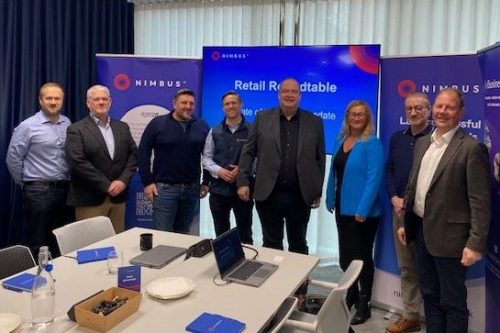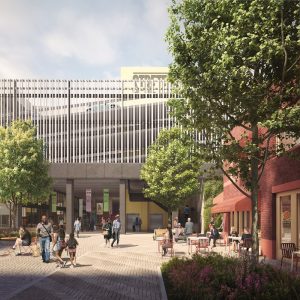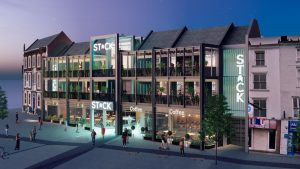Repositioning retail through purpose and partnerships

The challenges facing bricks-and-mortar retail, and consequently town and city centres, are not new.
They have been accelerated by the impact of the pandemic. But they were pre-dated by Government-commissioned reports including the Portas review and the Grimsey reviews, which have taken their place alongside many others in considering what the future could and should be for retail areas.

A key challenge for the sector – whether retailers, landlords, town planners or investors – was neatly captured by Paul Wright, property director at Stack Leisure, which is creating unique leisure spaces in different cities across the North.
Wright, who spent seven years working for retail investor New River, said: “I use this analogy – a shopping centre is like an island in the middle of a very rough sea, and that socio-economic change in town centres is the rough sea.
“It doesn’t matter if you paint it gold, you’re still not going to get people coming onto your island.”
He gave examples of where shopping centres had entered into a cycle of decline, before highlighting the successful work that Chris Roberts and his team at Bruntwood had done in partnerships in Trafford.
Roberts, chief development officer at Bruntwood, explained that not everywhere is equal, and that different places are on a different journey where the landowners and local authorities are understanding the subtle dynamics that contribute to an identity and a functioning, thriving market.
“We’ve got a job to do to get these places repositioned and resized,” he said. “But we’ve also got an education job to do on the investors and funders.
“We also need to be much more individualistic in our approach as to how we look at valuing something.”
He gave the example of how his team have repurposed Stretford, to the west of Manchester.
“If somewhere isn’t working you need to identify why,” said Roberts. “Then you need to identify what you want the place to be, and therefore what does it need to become.”

Stretford
Key to Stretford’s ongoing repurposing was a masterplan, with demographics, housing stock, educational, health outcomes and political leadership all playing a part.
Roberts added: “The only thing Stretford didn’t have was a town centre that everyone felt that they owned, and can be part of. It’s no coincidence that we’ve got planning for the whole because we’ve looked at planning in a much broader context.”
CBRE’s Stephen Proudly reminded the room about another important part of the region’s retail infrastructure, close to where Chris Roberts and his team have been reshaping Stretford.
“Everything Chris has achieved in Stretford, you have to remember, is also next door to the Trafford Centre, which is the best shopping mall outside of the two Westfields in London.
“It’s fabulous in the brands they get, way before anyone else. I think we benefit from that as a region, and we all just need to accept that.”
Proudley also noted how all the towns around the M60 are “finding their way” and going back to what they once were as a traditional market town.
Paul Davis from Nimbus agreed, noting the effect that different working patterns have had. He said: “The town centre needs to change and bring back a doctor’s surgery, a dentist and traditional artisan shops such as a traditional butcher, baker, candlestick maker.”
A dozen miles north from Trafford along the M60 is Bolton, which is facing its own challenges, some of which also stem from the impact of out-of-town retail developments.
Large retail moved out to the Middlebrook scheme, alongside the football stadium, more than 20 years ago and the town centre has struggled to define itself ever since.
Paul Morris from the Growth Company has previously been part of the Town Centre Partnership for his Bolton hometown as well as on Greater Manchester Chamber of Commerce’s board, representing Bolton.
He acknowledged it “has its challenges, as have a lot of the town centres around Greater Manchester and the UK”.
Morris said: “There is a lot of residential development closer to the centre, such as Moor Lane, by the bus station.
“The bulk of the developments around Bolton are around the university, which is unrecognisable to what it was a few years ago. Interestingly, 70% of the students at Bolton University are overseas students, so not a lot of those are going to be sticking around.
“There’s a lot of development, but there doesn’t seem to be a plan.”
Re-energising town centres need not just be about cranes and more storeys, but also a place’s culture and stories.
Jane Hough, deputy director for business improvement at Groundwork Cheshire and Lancashire, spoke about the efforts she has been involved in with Business Improvement Districts in several different locations, notably in the mid-Cheshire town of Northwich.
“We’ve created some sought-after festivals and an events programme for Northwich which have literally gone from zero to a significant investment over the last 8-10 years,” she said.

The Pina Colada Festival, Northwich
They include the Pina Colada Festival, in recognition of Northwich-born Rupert Holmes, the writer and singer of the world-famous Piña Colada song.
Hough said: “The event now is so significant, and one of our biggest challenges is how do we manage to build on that?”
She said it is also part of a wider repurposing of the town centre, and an example of conversations that take place everywhere.
“Local authorities are actually starting to realise that they can’t do things in isolation. Local partners are really key to supporting and making a difference in their places – and we’ve got really strong relationships with the local authorities that we work with,” she said.
Phil Schulze, BID manager at CityCo Manchester, the Business Improvement District for Manchester city centre, also highlighted the importance of placemaking and identity in driving people to places.
“The thing with placemaking is it’s about polishing what you’re good at.
“A role of BIDs or a CityCo, or the equivalent in a smaller market towns, is to find a niche and tell people about it. I think The Growth Company is very good at saying what’s here as well.
“What we do is then try and animate it in different seasons, because modern placemaking is people will come once and then make a view about I’m going to come again two, three, four times during the year.”
Paul Wright took the opportunity to highlight some of his innovative leisure and retail innovations with the Stack concept, which has acquired the Hatch site from Bruntwood, on Manchester’s Oxford Road.

Stack Leisure, Northampton scheme
“We are taking over Hatch, and are aiming to be opening around Easter next year. The next one will be in Lincoln, we took on an old Lakeland store, which is a Grade Two listed station building, and on the back of that was an old Argos, which is a steel framed unit. That’s quite exciting.
“That’s our first repurposing, but perhaps the most transformative is we bought a shopping centre in Northampton. We’re gutting the whole shopping centre to turn it into a Stack venue with a big stage and lots of street food bars and other things.”
The repurposing and reimagining of the site will bring together the elements of partnership, experiences, animation, and being part of the broader local context.
He added: “We’re told it’s the first transformation of a whole shopping centre like that, so that’s exciting as well.”








